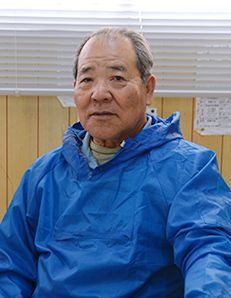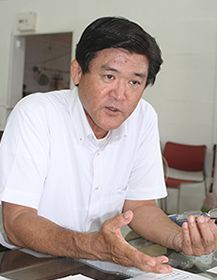Henoko citizens share their feelings one week after soil deposits began

Masao Nishikawa says, “If there is even a 1 percent possibility [to stop construction] we should oppose it.”
December 21, 2018 Ryukyu Shimpo
December 21 marked one week since soil deposits began at the planned land reclamation area in Oura Bay as part of the construction of the Futenma replacement facility in Henoko, Nago City. So, how do local Henoko citizens feel? Masao Nishikawa, 74 years old, has opposed the relocation plan for more than twenty years, ever since the relocation plan emerged. Director Tomoteru Tamari of the Henoko Chamber of Commerce, 59 years old, supports the plan as he hopes it will revitalize the city.
“Never give up,” says Masao Nishikawa
For more than 20 years, Nishikawa has expressed his intention to oppose the construction of a new base in Henoko. He insists that, “We must not say ‘We gave up.’”
On December 14 when the government forced through soil depositing work, he did not participate in the protest rally. He expressed his pain, “Every time I see news [reporting soil deposits] I feel pain in my chest. I could not join the heart-breaking rally.”
In 1997 when the relocation of USMC Futenma Air Station to Henoko was discussed, Nishikawa formed the Save Life Society with residents. The society appealed against the construction of the new base in Henoko Ward, yet was dissolved in 2015. Dissolution of the society was primarily due to the aging of the members. Nishikawa emphasized, “Not one among these residents gave up.”
Although Henoko Ward permits the construction of a new base conditionally, the Ministry of Defense finds difficulty in handling one of the conditions, specifically the separate compensation. Nishikawa says, “I want [the authorities] to take the opinions of residents into account with how they manage the ward.”
Twenty-two years have passed since the issue of new base construction emerged. Residents were divided into two camps on whether of not to accept the base. In regard to stopping new base construction, Nishikawa said, “I want [local authorities] to lead. We need to foster an environment where ward residents can take action.”
Tomoteru Tamari thinks compensation will brighten the town

Tomoteru Tamari is a representative of the Henoko Research Institute and a director of the Henoko Chamber of Commerce
Tamari hopes to revitalize Henoko Ward and asks the state for “a firm response to the matter of compensation and its promotion measures.” His father ran Restaurant Washington in Henoko. He remembers a bustling city. After renovating the closed restaurant, he launched the Henoko Research Institute, which handles corporate invitation.
He has complex feelings about the disappearance of the offer of separate compensation, which was one of the ward’s conditions for accepting the base. Tamari said: “Residents will oppose [the base] if there will be no separate compensation. Nevertheless, the state has reduced the budget of the dissenting prefecture. Can one fight the giant in power? The base will surely come. It will be meaningless if there is nothing left for the ward after opposing construction.”
The soil deposits began without the discussion of compensation reaching a conclusion. Looking back over the past 20 years, Tamari said, “The Defense Bureau told the residents to expect something. What will it do for the ward?” He pointed out that compensation should be asked with a firm attitude, saying, “We have to negotiate with the state so that the compensation issue can be solved. We need them to think Henoko is a top priority.”
Tamari spoke persuasively, “I want Henoko to be a lively city. Even if the base comes, we need to do our best so that our children can live happily.”
(English translation by T&CT and Megumi Chibana)
Previous Article:White House petition to halt Henoko construction reaches 100,000 signature goal in 10 days
Next Article:Okinawa Prefectural Assembly demands immediate halt to soil deposits in Henoko
[Similar Articles]
- ODB begins soil deposits into new land reclamation section in Henoko at 2:58 p.m. on March 25
- Governor Tamaki visits soil depositing site in Henoko, reaffirms position against new base
- Citizens’ rally draws 2000 participants who protest against Henoko base construction
- Icon of Henoko movement Muneyoshi Kayo passes away
- August prefectural rally against Henoko soil deposits expected to draw over 30,000 participants
 Webcam(Kokusai Street)
Webcam(Kokusai Street)


